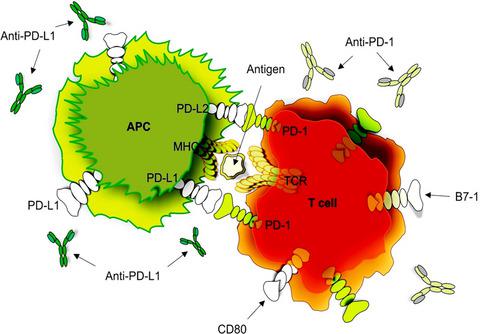当前位置:
X-MOL 学术
›
Chem. Bio. Drug Des.
›
论文详情
Our official English website, www.x-mol.net, welcomes your feedback! (Note: you will need to create a separate account there.)
Programmed cell death ligand-1: A dynamic immune checkpoint in cancer therapy.
Chemical Biology & Drug Design ( IF 3 ) Pub Date : 2020-03-12 , DOI: 10.1111/cbdd.13677 Muhammad Kalim 1 , Muhammad Saleem Iqbal Khan 1 , Jinbiao Zhan 1
Chemical Biology & Drug Design ( IF 3 ) Pub Date : 2020-03-12 , DOI: 10.1111/cbdd.13677 Muhammad Kalim 1 , Muhammad Saleem Iqbal Khan 1 , Jinbiao Zhan 1
Affiliation

|
Antibody‐based immunotherapies play a pivotal role in cancer research with efficient achievements in tumor suppression. Tumor survival is assisted by modulation of immune checkpoints to create imbalances between immune cells and cancer cell's environment. The modulation results in T‐cell signal inhibition ultimately inert its proliferation and activation against various tumor cells. PD‐L1, a 40 kDa transmembrane protein of B7 family, binds with PD‐1 on the membrane of T cells which results in inhibition of T‐cell proliferation and activation. PD‐L1/PD‐1 pathway has generated novel target sites for antibodies that can block PD‐L1/PD‐1 interactions. The blockage results in T‐cell proliferation and tumor cell suppression. The PD‐L1 immune checkpoint strategies’ development, expression and regulations, signal inhibitions, and developmental stages of PD‐L1/PD‐1 antibodies are briefly discussed here in this review. All this information will provide a base for new therapeutic development against PD‐L1 and PD‐1 immune checkpoint interactions and will make available promising treatment options.
中文翻译:

程序性细胞死亡配体-1:癌症治疗中的动态免疫检查点。
基于抗体的免疫疗法在癌症研究中起着举足轻重的作用,在抑制肿瘤方面取得了有效的成就。调节免疫检查点可帮助肿瘤存活,从而在免疫细胞和癌细胞环境之间产生失衡。调节导致T细胞信号抑制,最终使其针对各种肿瘤细胞的增殖和活化失活。PD‐L1是B7家族的40 kDa跨膜蛋白,与T细胞膜上的PD‐1结合,从而抑制T细胞的增殖和活化。PD‐L1 / PD‐1途径产生了可阻断PD‐L1 / PD‐1相互作用的抗体新靶位。阻断导致T细胞增殖和肿瘤细胞抑制。PD‐L1免疫检查点策略的发展,表达和调控,信号抑制,本文简要讨论了PD-L1 / PD-1抗体的发育和发展阶段。所有这些信息将为针对PD-L1和PD-1免疫检查点相互作用的新疗法开发提供基础,并将提供可用的有前景的治疗选择。
更新日期:2020-03-12
中文翻译:

程序性细胞死亡配体-1:癌症治疗中的动态免疫检查点。
基于抗体的免疫疗法在癌症研究中起着举足轻重的作用,在抑制肿瘤方面取得了有效的成就。调节免疫检查点可帮助肿瘤存活,从而在免疫细胞和癌细胞环境之间产生失衡。调节导致T细胞信号抑制,最终使其针对各种肿瘤细胞的增殖和活化失活。PD‐L1是B7家族的40 kDa跨膜蛋白,与T细胞膜上的PD‐1结合,从而抑制T细胞的增殖和活化。PD‐L1 / PD‐1途径产生了可阻断PD‐L1 / PD‐1相互作用的抗体新靶位。阻断导致T细胞增殖和肿瘤细胞抑制。PD‐L1免疫检查点策略的发展,表达和调控,信号抑制,本文简要讨论了PD-L1 / PD-1抗体的发育和发展阶段。所有这些信息将为针对PD-L1和PD-1免疫检查点相互作用的新疗法开发提供基础,并将提供可用的有前景的治疗选择。



























 京公网安备 11010802027423号
京公网安备 11010802027423号